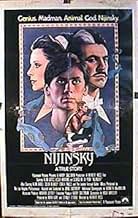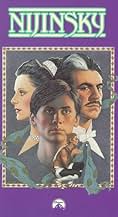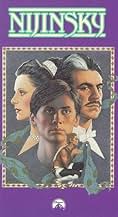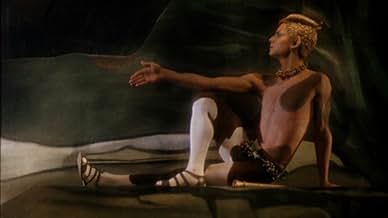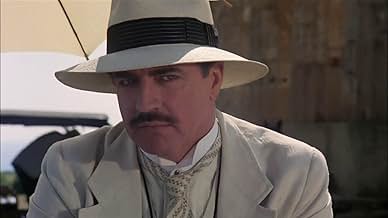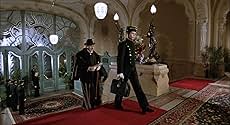The story of Vaslav Nijinsky, who is widely believed to be one of the greatest ballet dancers of all time. Based on Romola Nijinsky's "Last Years Of Nijinski.The story of Vaslav Nijinsky, who is widely believed to be one of the greatest ballet dancers of all time. Based on Romola Nijinsky's "Last Years Of Nijinski.The story of Vaslav Nijinsky, who is widely believed to be one of the greatest ballet dancers of all time. Based on Romola Nijinsky's "Last Years Of Nijinski.
- Director
- Writers
- Stars
Tomaso Milian Jr.
- Young Boy on Beach
- (as Tomas Milian Jr)
- Director
- Writers
- All cast & crew
- Production, box office & more at IMDbPro
Featured reviews
Whatever the facts may have been, the screenplay writers here have chosen to interpret the end of Nijinsky's dazzling career and his descent into madness, as being caused by the end of his romantic relationship with Diaghilev. An interesting premise - that what appeared to most people to be a simple case of a "dirty old man" exploiting a young man's ambition (or perhaps an ambitious young man exploiting an older man's lust), was in fact a genuine love affair. They weren't using each other, they genuinely loved each other.
Sadly, in 1980, it appears the film-makers were not brave enough to explore this fully enough for the film to work. The characters talk about passion a lot, but we don't see it much. Indeed the only love scene between the two men involves a couple of little kisses with a handkerchief held to their lips! How wonderful it would have been to see these two men genuinely passionate with each other - physically and spiritually - and how they managed to turn that passion into great works of art. This way we could understand Nijinsky's devastation when Diaghilev rejects him. As it stands, it seems to come from nowhere.
This is no fault of the actors. Both Alan Bates and George De La Pena do what they can, with the scenes that they have. What a shame the film wasn't made a few years later, when gay relationships could be explored on screen more completely. This could have been one hell of a film. As it is, the ballet reconstructions are excellent and the costumes superb. Performances are strong, with the possible exception of Leslie Browne, who is a little out of her depth here as the scheming rich girl chasing Nijinsky. She fared much better in Herbert Ross' earlier ballet film THE TURNING POINT.
Herbert Ross was a terrific choice to direct the film, having been a professional ballet director and choreographer, and the film has a superb sense of period and great style. But the heart is missing. The racing heartbeats of two men, and two great artists, madly in love.
Sadly, in 1980, it appears the film-makers were not brave enough to explore this fully enough for the film to work. The characters talk about passion a lot, but we don't see it much. Indeed the only love scene between the two men involves a couple of little kisses with a handkerchief held to their lips! How wonderful it would have been to see these two men genuinely passionate with each other - physically and spiritually - and how they managed to turn that passion into great works of art. This way we could understand Nijinsky's devastation when Diaghilev rejects him. As it stands, it seems to come from nowhere.
This is no fault of the actors. Both Alan Bates and George De La Pena do what they can, with the scenes that they have. What a shame the film wasn't made a few years later, when gay relationships could be explored on screen more completely. This could have been one hell of a film. As it is, the ballet reconstructions are excellent and the costumes superb. Performances are strong, with the possible exception of Leslie Browne, who is a little out of her depth here as the scheming rich girl chasing Nijinsky. She fared much better in Herbert Ross' earlier ballet film THE TURNING POINT.
Herbert Ross was a terrific choice to direct the film, having been a professional ballet director and choreographer, and the film has a superb sense of period and great style. But the heart is missing. The racing heartbeats of two men, and two great artists, madly in love.
This little-seen film by Herbert Ross chooses to focus on the rise and fall of Vaslav Nijinsky, petulant and superb dancer, and his stormy relationship with his producer-lover, Sergei Diaghilev. This story from with the heart of Ballet Russes has been well-documented before and here we see the descent into madness of a great, if unhinged artist.
George De La Pena plays the title role, and his dancing is a dream. Alan Bates is excellent as Diaghilev, all repressed passion and deep thoughts. The film tries its best to portray this unorthodox relationship with the ballet at its core, but doesn't quite get there - a sign of the times, perhaps? A strength of 'Nijinsky' is the dance sequences which are replicated as they would have originally been performed, right up to the scandalous performance of the Fawn piece. The scenes where the unhappy dancer is confined to an asylum have less power but are as valid as any other sequence in the film.
George De La Pena plays the title role, and his dancing is a dream. Alan Bates is excellent as Diaghilev, all repressed passion and deep thoughts. The film tries its best to portray this unorthodox relationship with the ballet at its core, but doesn't quite get there - a sign of the times, perhaps? A strength of 'Nijinsky' is the dance sequences which are replicated as they would have originally been performed, right up to the scandalous performance of the Fawn piece. The scenes where the unhappy dancer is confined to an asylum have less power but are as valid as any other sequence in the film.
I consider this film a failure. It fails at being a good biopic about Nijinsky, as the facts are far too skewed in this telling. Part of this is because source material was sorely limited at the time, but it doesn't even match up with what was available. It fails at being a dance movie, as what little ballet is shown is unfortunately not filmed very well, with the worst offense being a choppy slow motion effect that ruins the climactic leap at the end of Spectre of the Rose. I can't fathom why the director, a former choreographer, would make such a stupid choice.
Those of you saying this film was "brave" for attempting to portray a gay romance on screen in 1980 - did we watch the same movie? The only kiss between two men in this involves a goofy and obvious gimmick with a tissue to avoid censorship, and besides that the relationship between the real Diaghilev and Nijinsky was far from romantic. It was an exploitative business transaction that quickly soured when Nijinsky decided to marry.
The film tries to cover a period of ten years in just two hours, which leads to idiotic insinuations, such as Nijinsky going mad because he sexually repressed himself, or because his brother was "insane" . The man was a schizophrenic; nothing specific actually caused his illness. The stress of not being able to find work after Diaghilev fired him for marrying Romola likely did exacerbate it along with other factors. But the fact remains that he was married to her for five years and had a child by her before he was institutionalized; saying he went crazy because of their marriage is ridiculous.
Okay, I'll throw the non-history buffs a bone. I know that most biopics play fast and loose with the truth, but this movie is just not good or enjoyable to watch even as a piece of entertainment. The acting is often melodramatic to the point of being cringe-worthy. Alan Bates as Diaghilev is good, but George de la Pena and Leslie Browne are very poorly cast as an overwrought Nijinsky and simpering Romola. The script contains a lot of really dumb moments (I laughed hysterically during the film's only "sex scene" which is soundtracked with Stravinsky's The Rite of Spring, as well as the cabin-trashing scene that is reminiscent of Tommy Wiseau's The Room), scenes which don't make a whole lot of sense, and throwaway lines which don't factor into the plot or mean anything later. Nijinsky kisses his female ballet partner (who is presented as an amalgam fulfilling the roles his partner Tamara Karsavina and his sister Bronia filled in real life) on the lips, and I guess it's supposed to be our first sign that he is trying to rebel against his nature and Diaghilev, but the scene ends awkwardly and nothing actually comes of it. So what was the point of the scene?
If you are curious about Nijinsky and the Ballet Russes and really want to see a movie version, go watch the BBC production Riot at the Rite - it's free on YouTube. Otherwise, this movie is pretty much irrelevant and I can't recommend it.
Those of you saying this film was "brave" for attempting to portray a gay romance on screen in 1980 - did we watch the same movie? The only kiss between two men in this involves a goofy and obvious gimmick with a tissue to avoid censorship, and besides that the relationship between the real Diaghilev and Nijinsky was far from romantic. It was an exploitative business transaction that quickly soured when Nijinsky decided to marry.
The film tries to cover a period of ten years in just two hours, which leads to idiotic insinuations, such as Nijinsky going mad because he sexually repressed himself, or because his brother was "insane" . The man was a schizophrenic; nothing specific actually caused his illness. The stress of not being able to find work after Diaghilev fired him for marrying Romola likely did exacerbate it along with other factors. But the fact remains that he was married to her for five years and had a child by her before he was institutionalized; saying he went crazy because of their marriage is ridiculous.
Okay, I'll throw the non-history buffs a bone. I know that most biopics play fast and loose with the truth, but this movie is just not good or enjoyable to watch even as a piece of entertainment. The acting is often melodramatic to the point of being cringe-worthy. Alan Bates as Diaghilev is good, but George de la Pena and Leslie Browne are very poorly cast as an overwrought Nijinsky and simpering Romola. The script contains a lot of really dumb moments (I laughed hysterically during the film's only "sex scene" which is soundtracked with Stravinsky's The Rite of Spring, as well as the cabin-trashing scene that is reminiscent of Tommy Wiseau's The Room), scenes which don't make a whole lot of sense, and throwaway lines which don't factor into the plot or mean anything later. Nijinsky kisses his female ballet partner (who is presented as an amalgam fulfilling the roles his partner Tamara Karsavina and his sister Bronia filled in real life) on the lips, and I guess it's supposed to be our first sign that he is trying to rebel against his nature and Diaghilev, but the scene ends awkwardly and nothing actually comes of it. So what was the point of the scene?
If you are curious about Nijinsky and the Ballet Russes and really want to see a movie version, go watch the BBC production Riot at the Rite - it's free on YouTube. Otherwise, this movie is pretty much irrelevant and I can't recommend it.
If you, like me, are a Nijinsky fan, go ahead and watch it
But I have some complaints
The film is great, don't get me wrong, but I felt like it lacked more simple scenes between Diaghilev and Nijinsky More on why they fell in love How it all started They focus a lot on the consequences of this, but not on the reasons of why it happened in the first place
I mean,yeah,love doesn't have a reason to happen and blah blah blah But when we start the movie, they already like each other Personally, I found the film a bit massive, as it lacks lighthearted scenes
I understand that they chose to focus on the tragedy, but if they really showed the reason that made Nijinsky stay, the love between them, I believe the moment where it all falls apart would be even better I would also have liked to have seen a scene of Nijinsky protecting Diaghilev, in addition to just Diaghilev protecting him, and to show Nijinsky's reaction to this protection, too More physical and emotional intimacy beyond arguments
Furthermore, they did not mention anything about WWI, which was a big reason for Nijinsky's downfall, as he was considered an enemy as he was in Belgium, due to his Russian citizenship
Despite this, overall, the film is great The costumes are realistic, the performances, in my opinion, are great and they managed to demonstrate the consequences very well, even with the lack of reasons.
The film is great, don't get me wrong, but I felt like it lacked more simple scenes between Diaghilev and Nijinsky More on why they fell in love How it all started They focus a lot on the consequences of this, but not on the reasons of why it happened in the first place
I mean,yeah,love doesn't have a reason to happen and blah blah blah But when we start the movie, they already like each other Personally, I found the film a bit massive, as it lacks lighthearted scenes
I understand that they chose to focus on the tragedy, but if they really showed the reason that made Nijinsky stay, the love between them, I believe the moment where it all falls apart would be even better I would also have liked to have seen a scene of Nijinsky protecting Diaghilev, in addition to just Diaghilev protecting him, and to show Nijinsky's reaction to this protection, too More physical and emotional intimacy beyond arguments
Furthermore, they did not mention anything about WWI, which was a big reason for Nijinsky's downfall, as he was considered an enemy as he was in Belgium, due to his Russian citizenship
Despite this, overall, the film is great The costumes are realistic, the performances, in my opinion, are great and they managed to demonstrate the consequences very well, even with the lack of reasons.
Saw this little seen film on Talking Pictures some weeks ago, in memory of Ronald Pickup who had died a couple of days before. There are a lot more interest points too about 'Nijinsky'. Am a massive classical music and ballet enthusiast, have been since six in regard to the latter (it's been lifelong with the former) when seeing 'Swan Lake' for the first time. The characters are also real life figures (not just Vaslav Nijinsky, but also Sergei Diaghliev and Igor Stravinsky), and the cast is an immensely talented one.
'Nijinsky' struck me as very interesting and generally well done. It is far from perfect (with a few major debits) and is far more successful in its depiction of the ballet world, the classical music and ballet and how influential it was back in the day than the biographical elements and the aspect that would have made it a brave film. Did though appreciate what 'Nijinsky' tried to do, and it is a shame that it is seen so little and only had a very mixed critical reception as it is better than that. Even if it did fall short of its full potential.
There are many things worth noting here in 'Nijinsky'. It is a beautiful looking film for one, the designers did their homework when it came to the handsome costumes in making them true to period. The production design doesn't look overblown or confined, just about opened up enough while not trying to do too much and being sumptuous and unforgiving. The photography likewise doesn't resort to gimmicks, that would have swamped and/or cheapened things, or look too stage-bound, anybody who loves endearingly old-fashioned period dramas will find that 'Nijinsky' reminds them of those. Only at the clumsily edited end of "Le Spectre De La Rose" does it disappoint.
Cannot say anything wrong about the music, all classical and ranging from Weber to Stravinsky, which is nothing short of outstanding and beautifully performed and used with some of the most ferocious uses of any Stravinsky piece on film. Debussy on film has seldom been more luminously seductive as well. The ferociousness of the Stravinsky is particularly evident in a truly harrowing sequence when "Rite of Spring" is rehearsed and the counting is all over the place, a sequence that might make one think twice about taking on ballet. Nor can be choreography or dancing be faulted, done how it would have been performed at the time, particularly good in the sensual choreography of "L'Apres Midi D'Un Faune" (in a performance that proved to be scandalous). The Rimsky Korsakov is also movingly done.
Enough of the story does intrigue and has a 'The Red Shoes' vibe in the dance sequences and first half. The film also captures very well the glamour and beauty of ballet but also its demanding nature and competitiveness, in a way that is very accurate (two of my sisters were ex-dancers). The character interaction is well done too, especially the tensions in rehearsals. The acting is very good, with Alan Bates in fact being truly excellent as Diaghliev. Making him monstrous but also human. Pickup is wonderfully eccentric as Stravinsky and George De La Pena is very committed in his portrayal of Nijinksy.
Unfortunately though, 'Nijinsky' could have been better than it was. Nijinsky's mental state and madness that features prominently later could have gone into much more depth, that did lack intensity and should have been a lot more harrowing and moving than it was. Also thought it skated over. More disappointing was the relationship between Nijinsky and Diaghliev, Bates and De La Pena have the chemistry but the film should have been a lot bolder in depicting this relationship. The representation here was so tame and cautious that one would not think that that would have been a shock, at a time where homosexuality was even more negatively thought of than it is now.
Most of the performances are very good, with the exception of Leslie Browne. For my tastes, she was very bland in a role that seemed underwritten. Some of the pace seemed over-deliberate.
In conclusion, interesting and underseen but for a film with a couple of controversial events it did feel too careful. 6/10.
'Nijinsky' struck me as very interesting and generally well done. It is far from perfect (with a few major debits) and is far more successful in its depiction of the ballet world, the classical music and ballet and how influential it was back in the day than the biographical elements and the aspect that would have made it a brave film. Did though appreciate what 'Nijinsky' tried to do, and it is a shame that it is seen so little and only had a very mixed critical reception as it is better than that. Even if it did fall short of its full potential.
There are many things worth noting here in 'Nijinsky'. It is a beautiful looking film for one, the designers did their homework when it came to the handsome costumes in making them true to period. The production design doesn't look overblown or confined, just about opened up enough while not trying to do too much and being sumptuous and unforgiving. The photography likewise doesn't resort to gimmicks, that would have swamped and/or cheapened things, or look too stage-bound, anybody who loves endearingly old-fashioned period dramas will find that 'Nijinsky' reminds them of those. Only at the clumsily edited end of "Le Spectre De La Rose" does it disappoint.
Cannot say anything wrong about the music, all classical and ranging from Weber to Stravinsky, which is nothing short of outstanding and beautifully performed and used with some of the most ferocious uses of any Stravinsky piece on film. Debussy on film has seldom been more luminously seductive as well. The ferociousness of the Stravinsky is particularly evident in a truly harrowing sequence when "Rite of Spring" is rehearsed and the counting is all over the place, a sequence that might make one think twice about taking on ballet. Nor can be choreography or dancing be faulted, done how it would have been performed at the time, particularly good in the sensual choreography of "L'Apres Midi D'Un Faune" (in a performance that proved to be scandalous). The Rimsky Korsakov is also movingly done.
Enough of the story does intrigue and has a 'The Red Shoes' vibe in the dance sequences and first half. The film also captures very well the glamour and beauty of ballet but also its demanding nature and competitiveness, in a way that is very accurate (two of my sisters were ex-dancers). The character interaction is well done too, especially the tensions in rehearsals. The acting is very good, with Alan Bates in fact being truly excellent as Diaghliev. Making him monstrous but also human. Pickup is wonderfully eccentric as Stravinsky and George De La Pena is very committed in his portrayal of Nijinksy.
Unfortunately though, 'Nijinsky' could have been better than it was. Nijinsky's mental state and madness that features prominently later could have gone into much more depth, that did lack intensity and should have been a lot more harrowing and moving than it was. Also thought it skated over. More disappointing was the relationship between Nijinsky and Diaghliev, Bates and De La Pena have the chemistry but the film should have been a lot bolder in depicting this relationship. The representation here was so tame and cautious that one would not think that that would have been a shock, at a time where homosexuality was even more negatively thought of than it is now.
Most of the performances are very good, with the exception of Leslie Browne. For my tastes, she was very bland in a role that seemed underwritten. Some of the pace seemed over-deliberate.
In conclusion, interesting and underseen but for a film with a couple of controversial events it did feel too careful. 6/10.
Did you know
- TriviaExecutive Producer Harry Saltzman had wanted to make a movie about Nijinsky for many years, first attempting to produce a version in 1970 with partner Albert R. Broccoli. The movie was started, but was never finished, it being cancelled by Broccoli and Saltzman. It is known as Nijinsky: Unfinished Project (1970). It starred Rudolf Nureyev, was written by Edward Albee, and directed by Tony Richardson.
- How long is Nijinsky?Powered by Alexa
Details
Box office
- Gross US & Canada
- $1,047,454
- Gross worldwide
- $1,047,454
- Runtime
- 2h 9m(129 min)
- Color
- Sound mix
- Aspect ratio
- 1.85 : 1
Contribute to this page
Suggest an edit or add missing content



